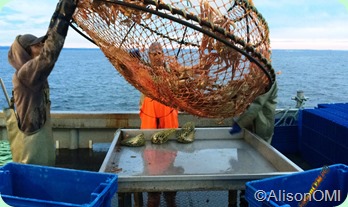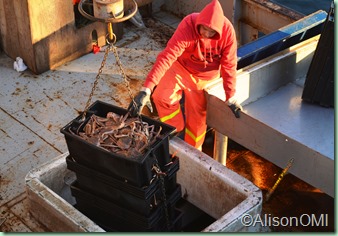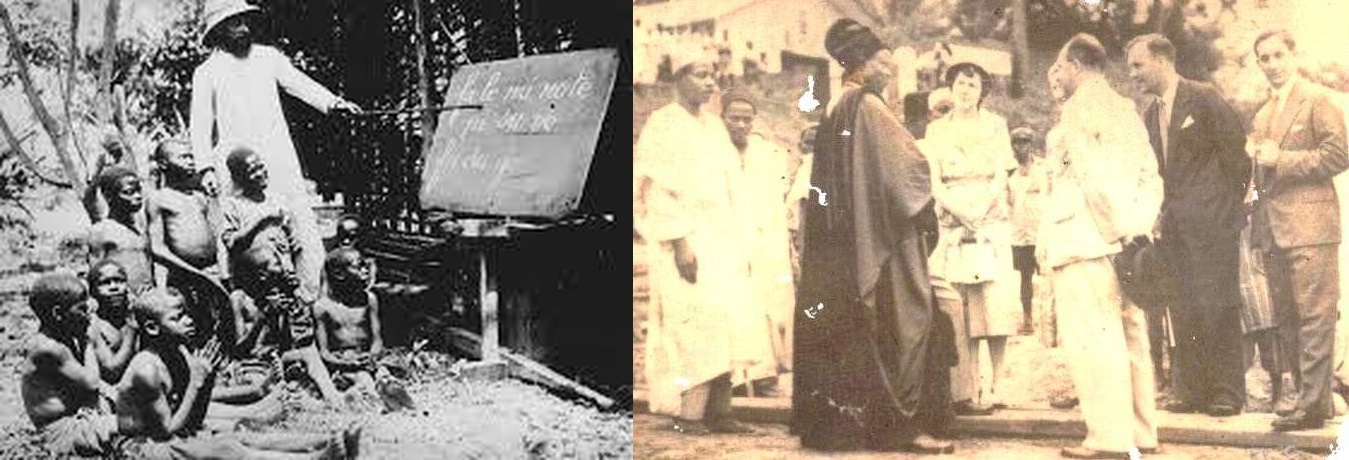 Fishing is a beautiful activity, but mainly when carried out as a recreational exercise, for fishing as a profession is a different thing all together. It is, as a matter of fact, one of the most stringent occupations in the world.
Fishing is a beautiful activity, but mainly when carried out as a recreational exercise, for fishing as a profession is a different thing all together. It is, as a matter of fact, one of the most stringent occupations in the world.
Degustation of fish and other seafood is, undoubtedly one if the best table activities in existence. But many folks who appreciate seafood are really ignorant of what it takes to have them delocalized from their aquatic habitat to our tables. Many even believe erroneously that majority of our fish are raised in domestic ponds.
My little experience with fishermen in Innu communities where I exercise my pastoral ministry has made me appreciate immensely whatever meal that comes from the sea. On leisure fishing experiences I had, I discovered that one thing is to go for fishing and another one is to catch fish. Three consecutive times I have gone fishing, I came back without even having a glimpse of a single fish.
 My first experience was on a salmon fishing experience which lasted for more than an hour without a single salmon nearing our baits. The second and third was in company of primary and secondary school students respectively. And in each of the two occasions, we went on ice fishing. And none of us had the slightest feel of a single codfish nearing our baits. With those few experiences I learnt that to be a fisherman, one must be patient.
My first experience was on a salmon fishing experience which lasted for more than an hour without a single salmon nearing our baits. The second and third was in company of primary and secondary school students respectively. And in each of the two occasions, we went on ice fishing. And none of us had the slightest feel of a single codfish nearing our baits. With those few experiences I learnt that to be a fisherman, one must be patient.
Moreover, if patience is needed in ordinary leisure fishing, resilience is unavoidable in industrial fishing.
Last year, I had the opportunity of going for crab fishing in the large of Saint Lawrence River, in the Coast of Port-Cartier, Quebec. Crab fishing, unlike ordinary salmon fishing, is a very hard and difficult fishing experience. It, first, demands many hours of travel into the sea. And unlike ordinary leisure fishing where you are never sure of catching fish, in crab fishing, you come back with a large quantity of crabs.
 It is also an early hour fishing experience. Fishermen leave the port late into the night only to come back later in the evening of the next day. They usually travel long hours into the river before starting their activities which consist in uplifting already placed fishing baskets. Once lifted, the baskets are emptied into recipients and baits set on the baskets which in turn, is placed back into the river. These activities, in many occasions, take more than seven hours before the fishermen will begin to think of putting an end to their daily experience. So, each fishing tour takes not less than twelve hours.
It is also an early hour fishing experience. Fishermen leave the port late into the night only to come back later in the evening of the next day. They usually travel long hours into the river before starting their activities which consist in uplifting already placed fishing baskets. Once lifted, the baskets are emptied into recipients and baits set on the baskets which in turn, is placed back into the river. These activities, in many occasions, take more than seven hours before the fishermen will begin to think of putting an end to their daily experience. So, each fishing tour takes not less than twelve hours.  And notwithstanding the hardships involved: sea agitation and other unfavourable sea experiences, fishing is a very nice experience. It brings the fishermen in contact, not only with the nature but also with themselves. At the middle of the sea, every fisherman faces his finitude and littleness. The abysmal depth and limitlessness of the water bodies, the presence of different types of sea animals, ranging from the littlest ones to certain unknown big sea creatures, seldom captured by the boat radar, and both the infinitely small and the infinitely great, bring to the mind of the fishermen the simple fact that our ecosystem belongs not only to us.
And notwithstanding the hardships involved: sea agitation and other unfavourable sea experiences, fishing is a very nice experience. It brings the fishermen in contact, not only with the nature but also with themselves. At the middle of the sea, every fisherman faces his finitude and littleness. The abysmal depth and limitlessness of the water bodies, the presence of different types of sea animals, ranging from the littlest ones to certain unknown big sea creatures, seldom captured by the boat radar, and both the infinitely small and the infinitely great, bring to the mind of the fishermen the simple fact that our ecosystem belongs not only to us. 




